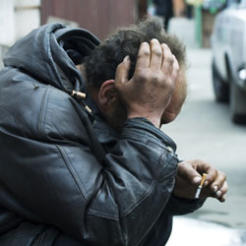A homelessness charity for Scots in London has been offered up to £50,000 of match funding for the next three years by the Scottish government, after it cut all grant funding to the charity.
The match funding, which has been made available from confiscated criminal funds, is conditional on the Church of Scotland, which founded the charity, matching the offer through fundraising efforts.
Borderline, which has supported homeless Scots in London since 1990, warned that it was facing closure last month. Borderline chief executive Willie Docherty told civilsociety.co.uk that Holyrood (home to the Scottish Parliament) announced in December 2011 that funding would be slashed in its entirety, due to an apparent reluctance to fund a charity outside of Scottish borders.
Scottish politicians rallied against the decision, said Docherty, with a motion being called in Scottish Parliament for the funding to be reinstated.
Meeting with First Minister
But the prime facilitator in the apparent u-turn is the moderator of the Church of Scotland, the Right Reverend David Arnott, who arranged a meeting with the First Minister to request that the grant funding be reinstated. The match funding offer is a "direct result" of this meeting, the Scottish government said.
The Reverend also called on the churches' congregations to raise "at least £100 each" for the charity. So far its congregations have raised around £8,000.
On hearing of the Scottish government's pledge of support, which will provide £50,000 per annum until 2015, Rev Arnott said: "It is crucial that the Scottish community stands together to ensure that no vulnerable Scot in London is without the support they need. The Church of Scotland is willing to do what it can and I am delighted the First Minister has stated the Scottish government will match whatever congregations raise."
Depreciation of funding
Borderline showed expendable reserves to the order of £136,835 in its accounts for the year end 31 March 2010 (the latest available), enough to cover 14 months normal expenditure. But its income was heavily reliant on government funding, with around half coming from grants and half from legacies, covenants and gift aid donations.
As Borderline became aware of imminent funding cuts, it was forced to put in place a fundraising strategy and employ a part-time fundraiser, working three days a week to target trusts and individuals, Docherty said. However the news that all funding would be cut came just 14 months after the fundraiser was employed, too soon for tangible fundraising results to be felt.
"A fundraising strategy will take about three years to mature properly," he said, "and then they just cut the feet from under us effectively."
The charity had not had to dip into reserves yet, because the funding cuts would not have come into effect until 1 April, but the match funding came in the nick of time, said Docherty, who added that additional fundraising would be essential for the charity's survival:
"There is a great need for support for vulnerable homeless Scots in London and had we not received this grant, it is highly likely that Borderline would have closed its doors within months.
"Recognition by the Scottish government that there is a need for this kind of support in London and reinstating our funding is very welcome however, this is only a stepping stone as we still require to enlist the support of more Scots generally, and here in London in particular, to ensure the long term future of our services to homeless Scots in London," he said.
Money comes from seized criminal funds
The Scottish government's funding has been made available from money confiscated from "crooks and fraudsters", recovered through the legislation process. Scottish housing minister Keith Brown said that by using the proceeds of crime, Scotland's budget for funding homelessness charities in Scotland would not be affected.









